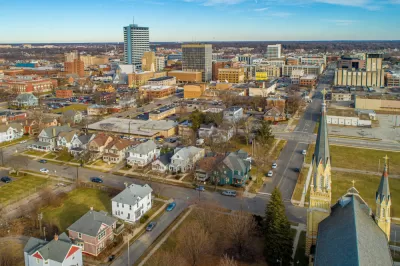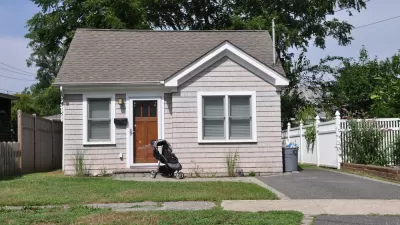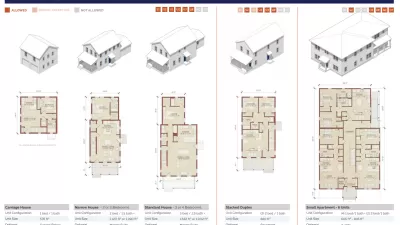The city hopes the templates, along with other incentive programs, will spur more housing construction on its vacant lots while maintaining neighborhood character and streamlining the development process.

A program that offers pre-approved development templates to South Bend developers provides a positive model for how cities can streamline the development process and encourage small developers to build more housing, writes Daniel Herriges in Strong Towns.
The plans, developed with the help of incremental developers and design experts, are specifically crafted for South Bend’s existing neighborhoods, where they fit the current zoning rules, lot sizes and shapes, and market conditions, and nod to the city’s historic architectural vernacular.
City officials hope this will help fill the hundreds of vacant lots languishing in the city and lower construction and permitting costs for builders. “The city, in return, gets a predictable form of development that is aesthetically compatible and can be replicated at scale.”
By updating and simplifying its zoning code, providing Sears catalog-style templates for construction, and investing in programs like a $20,000 sewer hookup rebate that ease the cost burden of building new homes, the city of just over 100,000 offers a model for streamlining development and encouraging affordable, site-appropriate, housing construction in its neighborhoods.
While some critics may deride such “cookie-cutter” development, Herriges points out that the South Bend model shows that templates don’t have to be bland, universalized, or lacking in context. And, Herriges points out, “if you want to produce a lot of really attractive cookies in a short amount of time, a cookie cutter is a fantastic tool for the job.”
FULL STORY: Pre-Approved House Designs Jump-Start Infill Development in South Bend

Maui's Vacation Rental Debate Turns Ugly
Verbal attacks, misinformation campaigns and fistfights plague a high-stakes debate to convert thousands of vacation rentals into long-term housing.

Planetizen Federal Action Tracker
A weekly monitor of how Trump’s orders and actions are impacting planners and planning in America.

In Urban Planning, AI Prompting Could be the New Design Thinking
Creativity has long been key to great urban design. What if we see AI as our new creative partner?

Cal Fire Chatbot Fails to Answer Basic Questions
An AI chatbot designed to provide information about wildfires can’t answer questions about evacuation orders, among other problems.

What Happens if Trump Kills Section 8?
The Trump admin aims to slash federal rental aid by nearly half and shift distribution to states. Experts warn this could spike homelessness and destabilize communities nationwide.

Sean Duffy Targets Rainbow Crosswalks in Road Safety Efforts
Despite evidence that colorful crosswalks actually improve intersection safety — and the lack of almost any crosswalks at all on the nation’s most dangerous arterial roads — U.S. Transportation Secretary Duffy is calling on states to remove them.
Urban Design for Planners 1: Software Tools
This six-course series explores essential urban design concepts using open source software and equips planners with the tools they need to participate fully in the urban design process.
Planning for Universal Design
Learn the tools for implementing Universal Design in planning regulations.
Appalachian Highlands Housing Partners
Gallatin County Department of Planning & Community Development
Heyer Gruel & Associates PA
Mpact (founded as Rail~Volution)
City of Camden Redevelopment Agency
City of Astoria
City of Portland
City of Laramie





























